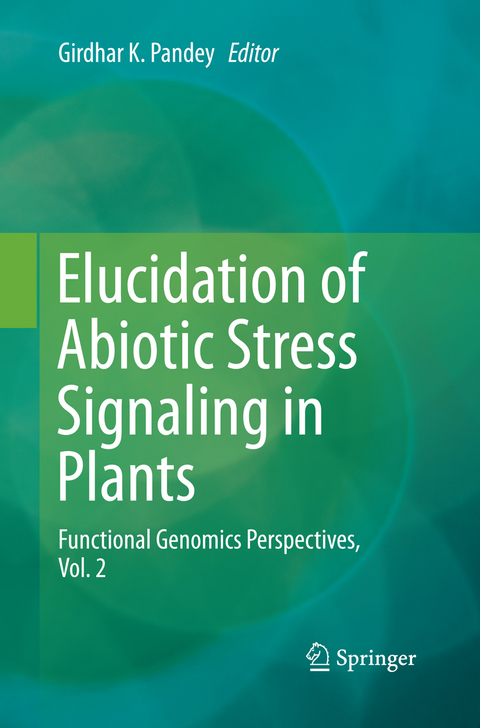
Elucidation of Abiotic Stress Signaling in Plants
Springer-Verlag New York Inc.
978-1-4939-4986-1 (ISBN)
Dr. Girdhar Pandey serves as Associate Professor for the Department of Plant Molecular Biology at the University of Delhi South Campus. Dr. Pandey has published and contributed to widely praised books on plant genetics and genomics, including GTPases: Versatile Regulators of Signal Transduction in Plants (Springer, 2015), Abiotic Stress Adaptation in Plants: Physiological, Molecular and Genomic Foundation (Springer, 2010), and Biotechnology in Sustainable Biodiversity and Food Security (Science Publishers, Inc., 2003).
Role of Plant Mediator Complex in Stress Response.- Towards understanding the transcriptional control of abiotic stress tolerance mechanisms in food legumes.- Insights into the small RNA mediated networks in response to abiotic stress in plants.- The Role of Long Non-coding RNAs in abiotic stress tolerance in plants.- Molecular physiology of heat Stress Responses in Plants.- The Omics of cold stress responses in plants.- Drought stress responses and signal transduction in plants.- Physiological and molecular mechanisms of flooding tolerance in plants.- Salt Adaptation Mechanisms of Halophytes: Improvement of Salt Tolerance in Crop Plants.- UV-B Photoreceptors, their role in photosignaling, physiological responses and abiotic stress in plants.- Analysis of signaling pathways during heavy metal toxicity: A functional genomic perspective.- Nitrogen and Stress.- Signaling pathways in eukaryotic stress, aging and senescence: Common and distinct pathways.- Designing climate smart future crops employing signal transduction components.- Abiotic Stress in Crops: Candidate Genes, Osmolytes, Polyamines and Biotechnological Intervention.- Abiotic stress tolerance and sustainable agriculture: A functional genomic perspective.
| Erscheinungsdatum | 31.10.2016 |
|---|---|
| Zusatzinfo | 26 Illustrations, color; 1 Illustrations, black and white; XVIII, 488 p. 27 illus., 26 illus. in color. |
| Verlagsort | New York |
| Sprache | englisch |
| Maße | 155 x 235 mm |
| Themenwelt | Naturwissenschaften ► Biologie ► Botanik |
| Naturwissenschaften ► Biologie ► Genetik / Molekularbiologie | |
| Naturwissenschaften ► Biologie ► Zellbiologie | |
| Weitere Fachgebiete ► Land- / Forstwirtschaft / Fischerei | |
| Schlagworte | functional genomics • plant anatomy • Plant Physiology • Plant signaling • plant stress |
| ISBN-10 | 1-4939-4986-1 / 1493949861 |
| ISBN-13 | 978-1-4939-4986-1 / 9781493949861 |
| Zustand | Neuware |
| Haben Sie eine Frage zum Produkt? |
aus dem Bereich


